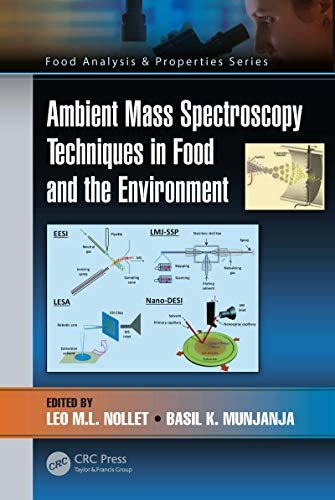
Ambient Mass Spectroscopy Techniques in Food and the Environment (Food Analysis & Properties) (English Edition)
- 作者
- Leo M.L. Nollet、Basil K. Munjanja
- 语言
- 英语
- 出版社
- CRC Press
- 出版日期
- 2019年1月30日
- 纸书页数
- 272页
- 电子书格式
- epub,pdf,mobi,azw3,txt,fb2,djvu
- 文件大小
- 13691 KB
- 下载次数
- 3873
- 更新日期
- 2023-04-04
- 运行环境
- PC/Windows/Linux/Mac/IOS/iPhone/iPad/iBooks/Kindle/Android/安卓/平板
内容简介
Ambient mass spectrometry—that is the use of mass spec but in the atmospheric environment—has been widely employed in food and environmental analysis. Ambient Mass Spectroscopy Techniques in Food and the Environment presents the theoretical underpinnings of mass spectrometry, and the benefits and pitfalls of ambient mass spectrometry, as well as the latest developments of the technique, in the analysis of food and environmental parameters. It describes methods that enable the detection of surface materials like waxes, alkaloids, flavors, or pesticides by plainly exposing the corresponding items to the ionization region of the interface, without harm to samples.
Features:
Explains the theoretical aspects of ambient mass spectrometry
Describes how to use ambient MS techniques for food safety, authenticity, and traceability screening
Lists the benefits of ambient MS in analysis of food and environmental parameters
Covers recent developments of ambient MS in analysis of food and environmental parameters
The specialized work provides insight to professionals practicing in food and the environment, including food scientists, food engineers, food biotechnologists, chemical engineers, and those working in research labs, universities, and government regulatory agencies.
Ambient Mass Spectroscopy Techniques in Food and the Environment (Food Analysis & Properties) (English Edition) EPUB, PDF, MOBI, AZW3, TXT, FB2, DjVu, Kindle电子书免费下载。
- 我的绝美女神老婆第1卷至第6卷大结局(全集) 一笔烟云
- 肥田仁医傻包子第2卷 三哭
- 宠妻成瘾:老婆,你要乖(阅文白金大神作家作品) 艾维斯迪恩
- 春秋战国的那些段子 (历史在左,段子在右) 尹杰
- 地应力与套管损坏机理 练章华
- 射孔操作工安全手册 中国石油天然气集团公司安全环保与节能部
- 未来世界超级星联网络第1卷(阅文大神作家秒速九光年作品,星海漫游,时空穿梭,机械科技,目标是未知的星辰大海!) 秒速九光年
- 我可能学的是假英语:英语、中式英语和偏误英语 有声典藏版 大卫·弗格森
- 玩游戏突破记忆力 (智力开发专项训练IV) 全脑潜能开发编辑部
- 肥田仁医傻包子 三哭
- Quantitative Understanding of Biosystems: An Introduction to Biophysics, Second Edition (Foundations of Biochemistry and Biophysics) (English Edition) Thomas M. Nordlund、Peter M. Hoffmann
- 动力沟通理论与实践 王文忠
- Membrane Technology for CO2 Sequestration (English Edition) Zeinab Abbas Jawad
- 只为你做蛋炒饭 御神狐
- 水驱油藏大孔道综合识别 张奇斌、李进旺、王晓冬
- 一吻定情,国名老公赖上我第3卷 曦葵
- 我可能学的是假英语:英语、中式英语和偏误英语.口袋版 大卫·弗格森
- 带你走进奥斯卡的世界:奥斯卡最佳影片(1—50届)简赏 朱腾明
- 独家宠婚:高冷老公呆萌妻(阅文白金大神作家作品) 辛呓呓
- 天然气集输工程 马国光
- 假太监老公太无赖 雨凉
- 锦衣当国第1卷(阅文集团大神作家特别白作品,历史小说,醒掌天下权,醉卧美人膝,五千年风华烟雨,是非成败转头空!) 特别白
- 恋爱日记之爱上小丘 晓喆
- 首席老公霸道宠:宝贝,继续(阅文白金大神作家作品) 柒惜
- Nanocatalysis: Applications and Technologies (English Edition) Vanesa Calvino-Casilda、Antonio José López-Peinado、Rosa María Martín-Aranda、Elena Pérez Mayoral
- 宝贝太惹火:老公,轻点宠(阅文白金大神作家作品) 兮烟
- 穿越之捡到包子当娘亲 火焰中的天堂鸟
- 良田千顷养包子第1卷 迷离陌上花
- Engineering Tools for Environmental Risk Management: 4. Risk Reduction Technologies and Case Studies (English Edition) Katalin Gruiz、Tamás Meggyes、Éva Fenyvesi
- Theoretical Physics for Biological Systems (English Edition) Paola Lecca、Angela Re